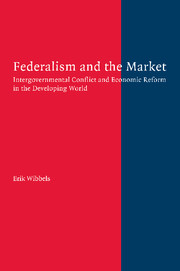Book contents
- Frontmatter
- Contents
- Acknowledgments
- 1 Intergovernmental Bargaining and Economic Policy in Federations
- 2 From Market-Preserving to Market-Distorting Federalism: Divergent Incentives and Economic Reform in Developing Nations
- 3 Federalism and the Decentralized Politics of Macroeconomic Policy and Performance
- 4 Testing the Model: Macroeconomic Reform Beyond the Federal-Unitary Distinction
- 5 Partisan Harmony, Intergovernmental Coordination, and Market Transitions: The Case of Argentina
- 6 Regional Competition, Fiscal Dependence, and Incentives in the Argentine Provinces
- 7 The View from Below: The Politics of Public Sector Reform in Three Argentine Provinces
- 8 Conclusion: Federalism, Reform, and Enduring Puzzles
- References
- Index
8 - Conclusion: Federalism, Reform, and Enduring Puzzles
Federalism, Economics, and Enduring Puzzles
Published online by Cambridge University Press: 20 July 2009
- Frontmatter
- Contents
- Acknowledgments
- 1 Intergovernmental Bargaining and Economic Policy in Federations
- 2 From Market-Preserving to Market-Distorting Federalism: Divergent Incentives and Economic Reform in Developing Nations
- 3 Federalism and the Decentralized Politics of Macroeconomic Policy and Performance
- 4 Testing the Model: Macroeconomic Reform Beyond the Federal-Unitary Distinction
- 5 Partisan Harmony, Intergovernmental Coordination, and Market Transitions: The Case of Argentina
- 6 Regional Competition, Fiscal Dependence, and Incentives in the Argentine Provinces
- 7 The View from Below: The Politics of Public Sector Reform in Three Argentine Provinces
- 8 Conclusion: Federalism, Reform, and Enduring Puzzles
- References
- Index
Summary
It is important to emphasize that Argentina's federal system is not an exception in the developing world. Indeed, in recent years state governments have obstructed the market reform impulse in a number of federations, including India, Russia, Nigeria, and Brazil. If anything, Argentina and its provinces represent a least likely place to find subnational politicians influencing the market reform process, and as such, it represents a rather tough test for the theoretical proposition that federalism complicates economic reform policies. Unlike Brazil, Argentina does have a relatively strong party system and (at least in the 1990s) a powerful president that can overcome some of the centrifugal forces that obstruct intergovernmental policy coordination. Unlike Nigeria, it does have some provincial governments with significant taxing and bureaucratic capacity. Unlike Russia, it does have a relatively stable system of intergovernmental finance that capacitates public sector planning. Unlike Pakistan, it has closed many of the most significant and structural soft budget constraints on provincial governments. Compared to nations such as Nigeria and Russia, democratic politics in a number of Argentine provinces do serve to check the worst of clientelistic excesses common to uncompetitive environments. In short, Argentina has a number of advantages over many significant federations in the developing world. Nevertheless, Argentina's process of market reform continues to run aground on provincial politics. Press reports throughout 2001 and 2002 continued to underscore the significance of provincial overspending and its role in Argentina's ongoing economic crisis, its worst since the Great Depression.
- Type
- Chapter
- Information
- Federalism and the MarketIntergovernmental Conflict and Economic Reform in the Developing World, pp. 223 - 248Publisher: Cambridge University PressPrint publication year: 2005

